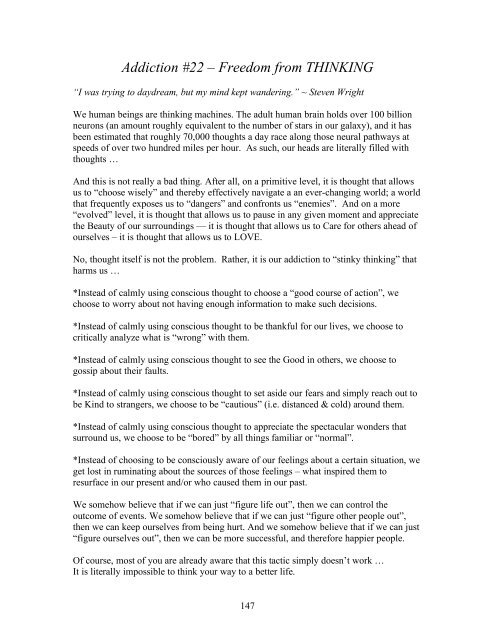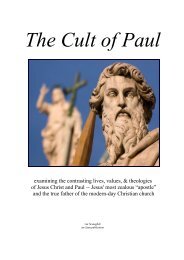Licking the Razor's Edge (2015)
Recognizing the hidden addictions that bind you, … to then set your True Self free
Recognizing the hidden addictions that bind you,
… to then set your True Self free
You also want an ePaper? Increase the reach of your titles
YUMPU automatically turns print PDFs into web optimized ePapers that Google loves.
Addiction #22 – Freedom from THINKING<br />
“I was trying to daydream, but my mind kept wandering.” ~ Steven Wright<br />
We human beings are thinking machines. The adult human brain holds over 100 billion<br />
neurons (an amount roughly equivalent to <strong>the</strong> number of stars in our galaxy), and it has<br />
been estimated that roughly 70,000 thoughts a day race along those neural pathways at<br />
speeds of over two hundred miles per hour. As such, our heads are literally filled with<br />
thoughts …<br />
And this is not really a bad thing. After all, on a primitive level, it is thought that allows<br />
us to “choose wisely” and <strong>the</strong>reby effectively navigate a an ever-changing world; a world<br />
that frequently exposes us to “dangers” and confronts us “enemies”. And on a more<br />
“evolved” level, it is thought that allows us to pause in any given moment and appreciate<br />
<strong>the</strong> Beauty of our surroundings — it is thought that allows us to Care for o<strong>the</strong>rs ahead of<br />
ourselves – it is thought that allows us to LOVE.<br />
No, thought itself is not <strong>the</strong> problem. Ra<strong>the</strong>r, it is our addiction to “stinky thinking” that<br />
harms us …<br />
*Instead of calmly using conscious thought to choose a “good course of action”, we<br />
choose to worry about not having enough information to make such decisions.<br />
*Instead of calmly using conscious thought to be thankful for our lives, we choose to<br />
critically analyze what is “wrong” with <strong>the</strong>m.<br />
*Instead of calmly using conscious thought to see <strong>the</strong> Good in o<strong>the</strong>rs, we choose to<br />
gossip about <strong>the</strong>ir faults.<br />
*Instead of calmly using conscious thought to set aside our fears and simply reach out to<br />
be Kind to strangers, we choose to be “cautious” (i.e. distanced & cold) around <strong>the</strong>m.<br />
*Instead of calmly using conscious thought to appreciate <strong>the</strong> spectacular wonders that<br />
surround us, we choose to be “bored” by all things familiar or “normal”.<br />
*Instead of choosing to be consciously aware of our feelings about a certain situation, we<br />
get lost in ruminating about <strong>the</strong> sources of those feelings – what inspired <strong>the</strong>m to<br />
resurface in our present and/or who caused <strong>the</strong>m in our past.<br />
We somehow believe that if we can just “figure life out”, <strong>the</strong>n we can control <strong>the</strong><br />
outcome of events. We somehow believe that if we can just “figure o<strong>the</strong>r people out”,<br />
<strong>the</strong>n we can keep ourselves from being hurt. And we somehow believe that if we can just<br />
“figure ourselves out”, <strong>the</strong>n we can be more successful, and <strong>the</strong>refore happier people.<br />
Of course, most of you are already aware that this tactic simply doesn’t work …<br />
It is literally impossible to think your way to a better life.<br />
147


















